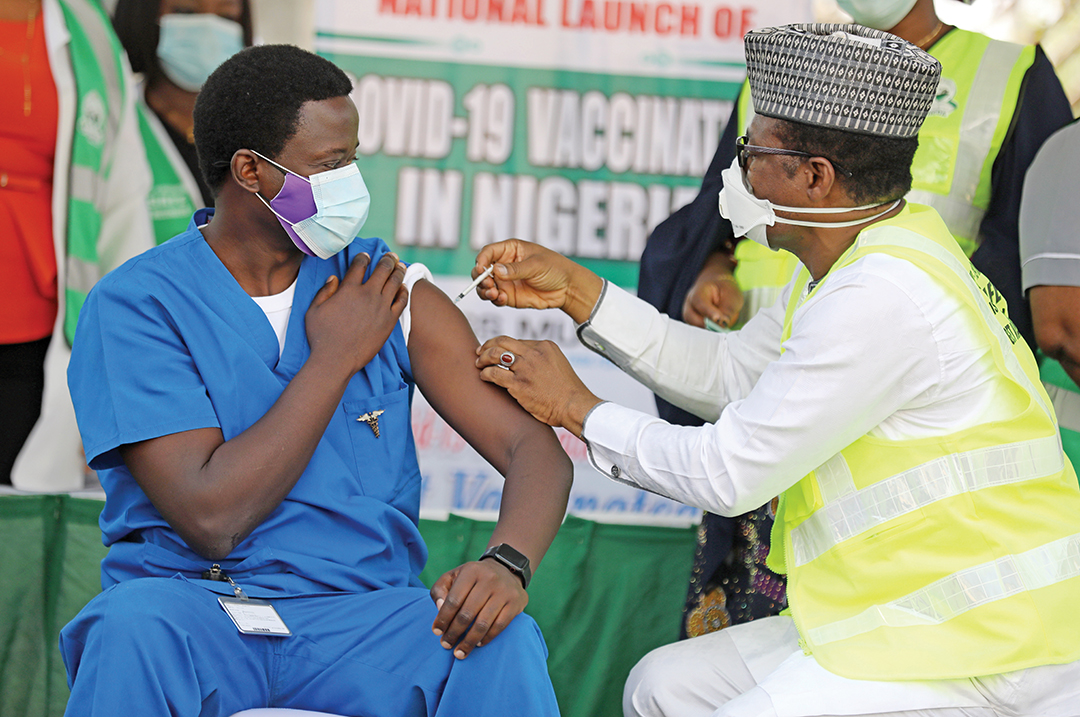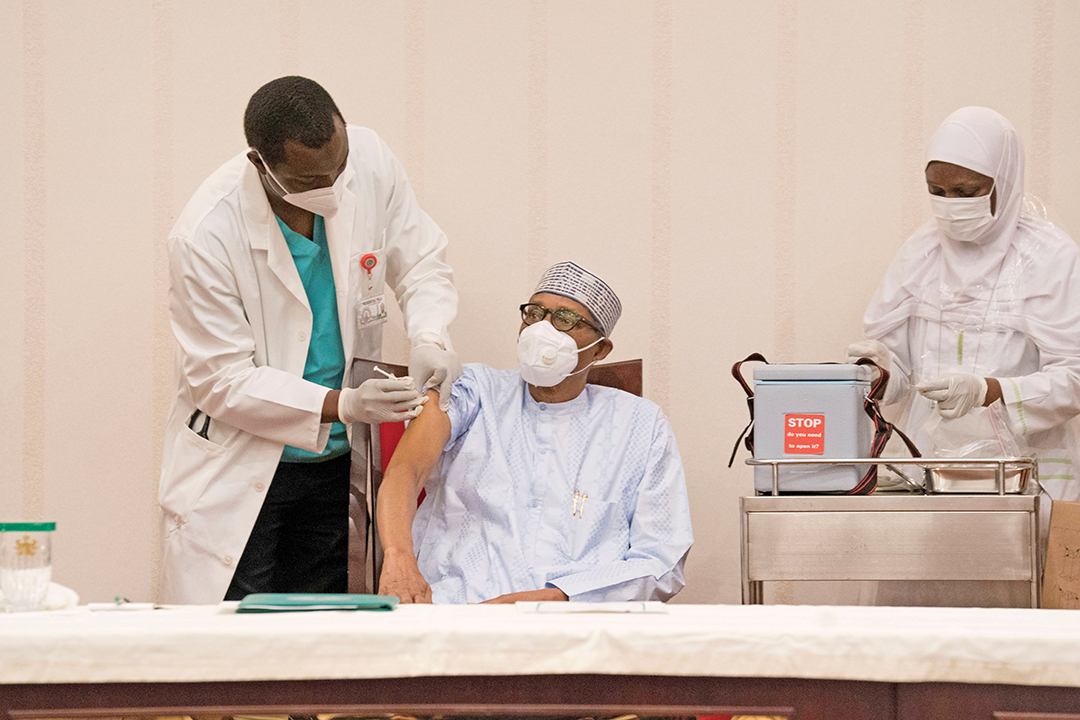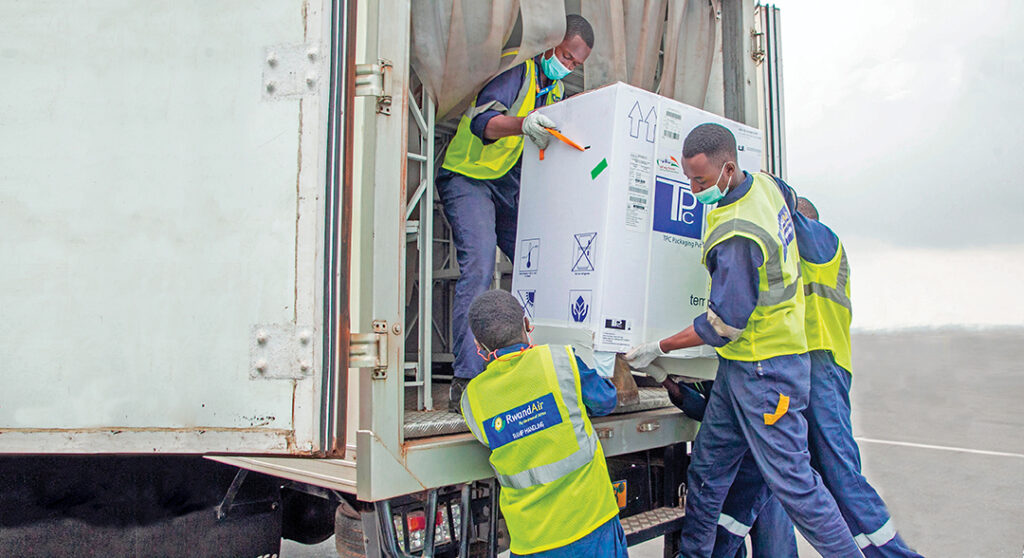Story by ADF STAFF | Photos by AFP/GETTY IMAGES
More than 20 African nations have started administering millions of free COVID-19 vaccines through COVAX, the global plan to equitably distribute the shots.
In the initial March 2021 rollout, prominent politicians, security personnel and front-line health care workers were among the first vaccine recipients. The United States has pledged $4 billion to support COVAX.
In Ghana, President Nana Akufo-Addo and first lady Rebecca Akufo-Addo received two of the first shots.

“It is important that I set the example that this vaccine is safe by being the first to have it so that everybody in Ghana can feel comfortable about taking this vaccine,” Akufo-Addo said during a live broadcast.
Led by the United Nations, COVAX is part of the Access to COVID-19 Tools Accelerator, launched in April 2020 by the World Health Organization (WHO), the European Commission and France. COVAX negotiates prices to ensure equitable access to COVID-19 vaccines, diagnostics and treatments, regardless of a country’s wealth.
The program aims to distribute 2 billion doses of the AstraZeneca vaccine worldwide by the end of 2021. Of that total, 600 million doses are earmarked for African nations, enough to vaccinate 20% of the continent’s population, according to the WHO.
Vaccines are allocated to every country equally after each completes a vaccine readiness assessment. Distribution is supported by Gavi, the Vaccine Alliance, and the Coalition for Epidemic Preparedness Innovations. COVAX also supports the research, development and manufacturing of a variety of COVID-19 vaccines.
By March 10, 2021, officials had delivered 10 million COVAX doses to African countries. The vaccines made an immediate impact, protecting some of those most at risk.
Côte d’Ivoire also received vaccine doses through COVAX. Medical personnel, teachers and security force members were vaccinated first.

“Vaccines save lives. As health workers and other front-line staff are vaccinated, we will see a gradual return to normal, especially for children,” Marc Vincent, UNICEF representative in Côte d’Ivoire, said in a story on the United Nations’ website. “In the spirit of universal health coverage, we must leave no one behind.”
In Nigeria, health care and front-line workers were the first to be inoculated.
Peter Hawkins, country representative for UNICEF, told Al-Jazeera that there still was a long way to go in fulfilling “our obligations to the people of Nigeria.”
“But close to 4 million is a big amount,” Hawkins said of the first COVAX delivery. “It’s a fantastic step forward for Nigeria and a fantastic step forward for the whole of Africa, and people will take them. There is no question about that.”
Among the first African countries to receive the vaccines through COVAX were Angola, the Democratic Republic of the Congo, The Gambia, Kenya, Malawi, Mali, Rwanda, São Tomé and Príncipe, Senegal, Sudan, and Uganda.
Patrick Amoth, director general of Kenya’s Ministry of Health, was one of the first in the country to receive the shot.
“I am feeling great,” Amoth told Reuters. “The vaccine is safe.”
As other countries received COVID-19 vaccines, Rwanda installed special infrastructure to provide ultra-cold storage required for some doses.
“These doses of COVID-19 vaccine from the COVAX facility represent an unprecedented global effort to have equitable access to COVID-19 vaccines,” Dr. Mwinga Kasonde, the country’s WHO representative, told Rwandan newspaper Taarifa.
Sudanese Health Minister Omar Ahmed al-Najib said the country’s vaccination campaign would prioritize health care workers and elderly people.
“The amount [of vaccines] reached today will be enough for a big part of those working in the health professions,” al-Najib told Agence France-Presse. “Because they are more susceptible to being infected [they will get vaccines first], for the sake of offering a safe health service for our citizens. The vaccine will be free for all citizens. More shipments will be arriving consecutively, God willing.” q

